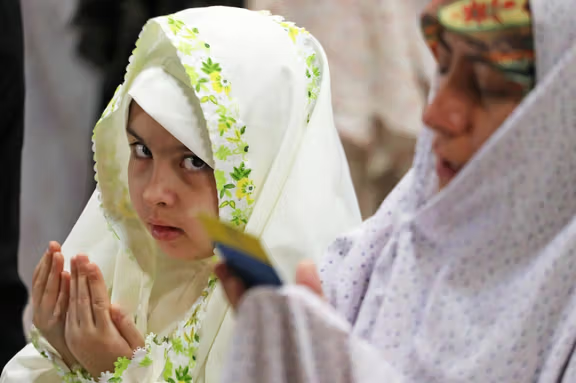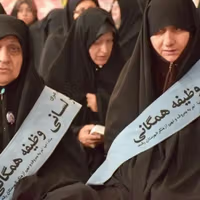Iran’s Sharia-based legal system contains a litany of provisions that discriminate against women, particularly in the areas of criminal, family, and inheritance law.
The measures go far beyond state enforcement of the Islamic face veil, which has become a symbol of the system's attempt to control and dominate women for the Islamic Republic's near-half-century existence.
Under Iran’s interpretation of Shia Islamic law, the age of legal responsibility differs significantly between girls and boys. Girls are considered legally responsible at the age of 9 lunar years (approximately 8 years and 9 months), while boys reach legal responsibility at 15 lunar years.
This age disparity has been repeatedly criticized by child rights advocates and international organizations. Some have proposed that the age of criminal responsibility for both girls and boys be equal, with a minimum threshold of at least 18 years. However, no such legal reform has been enacted to date.
Moreover, in criminal proceedings, the testimony of two women is considered equivalent to that of one man in most cases.
The concept of blood money (diyeh)—financial compensation paid by an offender to the victim’s family in cases of murder or manslaughter—is also unequal.
The amount paid for a female victim is half of what is paid for a male victim. The base amount is determined annually by Iran's Chief Justice, based on the value of 100 camels.
In some cases, women may face harsher penalties than men. Women can receive the death penalty for killing their children, whereas the legal response is legally and practically often less when a man commits a similar crime.
In addition to legal punishment for murder or manslaughter, for instance, a woman who kills her child must pay blood money to the father. Fathers and paternal grandfathers, however, are exempt from paying blood money to the mother in such cases due to their sole legal entitlement to their children’s blood money.
Marriage, Polygamy and Divorce
Regardless of age, women require the consent of their father or paternal grandfather to enter into a first marriage. Men, however, face no such restriction.
Men are also legally permitted to engage in polygamy, with the possibility of marrying up to four wives simultaneously through a court order.
They may enter into temporary marriages (known as sigheh or mut'ah) for a fixed period—ranging from minutes to years—without court approval or official registration.
These marriages automatically dissolve when the agreed-upon time expires.
For divorce, men legally hold the unilateral right to dissolve a marriage at will. Women, on the other hand, must apply to a court and present proof of their husband’s failure to fulfil obligations such as providing housing, food or healthcare.
They must also demonstrate that they have fulfilled their own marital duties, including obedience to their husband in areas such as sex and permission to leave the home.
Iranian law allows men to prevent their wives from traveling or taking up certain jobs, unless the woman obtains a power of attorney from her husband—either at the time of marriage or afterward—granting her the right to travel, work or initiate divorce.
Guardianship and Custody
Fathers have exclusive legal guardianship over their children. Mothers can only obtain guardianship if the father is dead and the paternal grandfather does not object.
In divorce cases, mothers retain custody only until the child reaches age seven, after which custody typically reverts to the father. Once a girl reaches 9 and a boy reaches 15 (the ages of adulthood in Shia law), they may choose which parent they will live with.
However, the father - or paternal grandfather, if the father has passed away - continues to be the legal guardian of children, often maintaining control over key aspects of their lives.
Additionally, women automatically lose custody of their children if they remarry, as long as the father is still alive.
Inheritance
In inheritance, a woman’s share is half that of a male heir in comparable circumstances.
For example, a daughter inherits half the amount her brother does. A widow is entitled to one-eighth of her husband's estate if they had children, or one-fourth if childless. The remaining assets typically go to the husband’s family.










